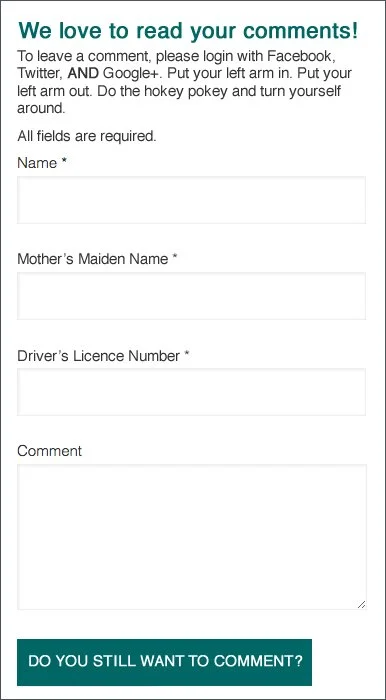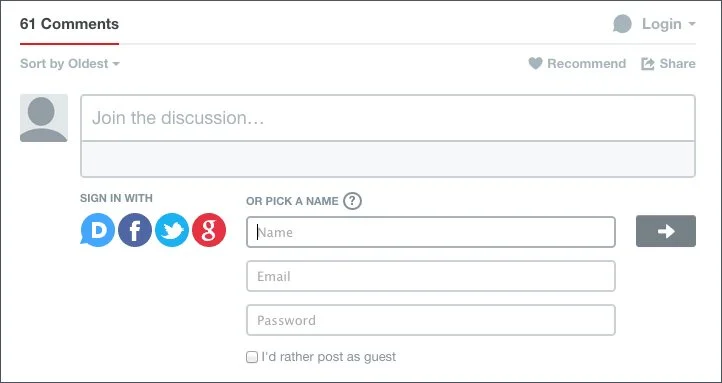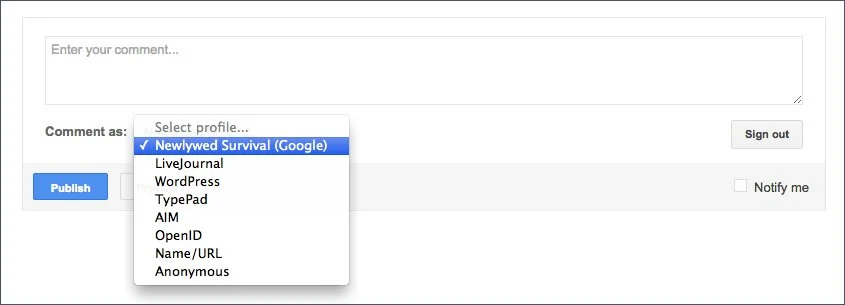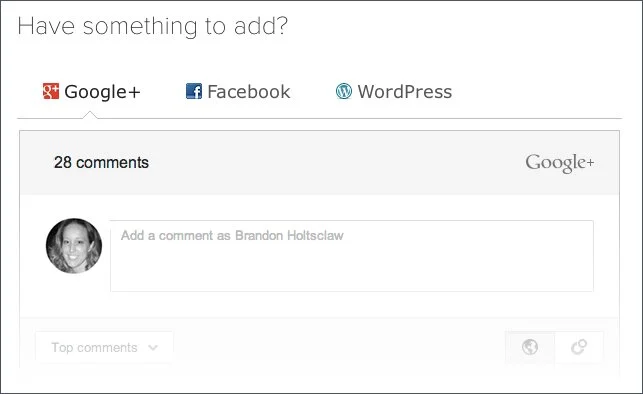
Not surprisingly, I visit many blogs during the day and read some great posts. If I really enjoy what I read, want to ask a question, or want to add to the discussion, I will comment on a blog post. Or, I should say, I TRY to comment. What do I mean? Well, it turns out that many bloggers don’t make it very easy for readers to comment.
Don’t ask your readers to give up their first born to comment
Some bloggers make you jump through hoops to contribute to the discussion. Although they may not ask for your first born, they may ask you to sign-up for a commenting system, do a math problem, or even require you to join a social media site to comment. Why do they do this? I’m sure most of them do it because they would like to prevent spam on their sites.
These ideas may prevent the spam, but they may also prevent real readers from commenting. Have you been asking yourself why more people don’t comment on your blog? Or do you only get comments from other bloggers in a reciprocal relationship? You may be making it too difficult for your readers to comment.

How to make it easy for readers to comment
If you are on WordPress, the simplest way for readers to comment is through the comment system provided by WordPress. This will usually require that a reader fill out their name and email before they comment (see my comment system below… and why not comment while you’re there?). Easy enough! So easy, that spammers find this type of comment system irresistible. This is why a good spam plugin like Akismet is essential for your WordPress blog. Akismet will weed out most of the spam and put it in a nice little folder waiting to be deleted!
How to allow guest comments in Disqus

Disqus is a commenting system that keeps track of where your readers comment and notifies them of any responses to their comments. This can create a community and bring people back to your site to read responses. However, some people may not want to sign up for Disqus and may just skip commenting. Or, they may register and then not like getting the email notifications, which will keep them from coming back to your site.
This doesn’t mean you need to get rid of Disqus. You can turn on guest commenting by going to Disqus admin > Settings > General page in the Guest Commenting setting. This will allow people to comment without creating an account. They will still need to provide a name and email.
How to allow guest comments in Jetpack

If you are on WordPress.com or you are using Jetpack, you may have the Jetpack commenting system. This system allows people to comment using their WordPress.com login, Twitter, Facebook or Google+. It also allows guest comments. If you are using Jetpack comments and don’t see a way to leave a comment with just a name/email, check in WordPress under Settings > Discussion and make sure guest commenting is allowed.
How to allow guest comments in Blogger

If you are on Blogger, you can allow guest commenting by going to Settings > Posts and Comments and for the question “Who can comment?” choose Anyone.
- But how do I prevent spam? The answer is through moderation. You can set it up so that all comments need to be moderated before going up live.
- But this can be time consuming isn’t there anything else I can do? The answer is yes. You can install Disqus on your Blogger blog. Just make sure that you allow guest commenting so you don’t lose out on comments!
How to allow guest comments in Comments Evolved Plugin

The Comments Evolved plugin (formerly Google+ Comments for WordPress) organizes your options for commenting into nice, neat tabs. To make sure that anyone can comment, allow WordPress commenting within the plugin. This adds a tab with the WordPress ‘W’ to the options. If you use this plugin, make sure that you make it obvious to your readers that they can comment using any of the tabs, not just the one that is currently showing. Although it may be obvious to you, it won’t be obvious to everyone.
What about social commenting?
Some blogs only allow readers to comment using Facebook. Or, they may only allow comments when logged into Google+. This means that not everyone can comment. Although most people will have either a Facebook or Google+ account, they may not feel comfortable leaving a comment using their actual name (which is required for FB and G+). This is especially true for posts of a very personal nature.
Give readers an option. If you want to include Facebook or Google+ commenting, also allow WordPress comments. Just make sure that you let your readers know they can comment in multiple ways. Some may not scroll below the FB comments to see they can comment without a FB account, and you miss out on comments.

Lastly, I want to address captcha boxes. This is when you require a reader to enter the word (or numbers) shown, or provide an answer to a simple question to prevent spam. This is a big deterrent for many would-be blog commenters. If you want more protection than Akismet provides, consider adding G.A.S.P. (or Growmap Anti Spambot Plugin). This plugin allows you to add a simple checkbox that must be checked prior to a comment being submitted. Readers are much more likely to check a box than to decipher letters.
If you make it easy for your readers to comment, they will be more likely to do it. It is also helpful if you ask them a question and then ask them to respond in the comments. It really works!
What is your favorite, or least favorite blog comment system? Share in the comments below. (see what I did there?)
 Looking for a group of supportive bloggers to help spread the word about your blog? Request to join the
Looking for a group of supportive bloggers to help spread the word about your blog? Request to join the
This post is perfect! The ones that kill me are the ones where it is either Facebook or Google+ only OR the ones that don’t allow Name/URL. Commenting in and of itself is kind of a chore. I agree, if there is too much more stuff to do added to it, most people will say “forget it” and move on.
I know it stinks to clean our spam, but there are lots of things you can do about it besides leaving the responsibility of preventing spam to the potential real commenters through chores and hoops to jump through.
Totally agree, Dawn! The FB or G+ only option really keeps people from commenting. I know that on some sites I have wanted to ask a question, but don’t want to seem stupid. No way am I leaving a comment with my FB account for all to see!
Oh, and I totally knew the f of x part of the equation above. Then you lost me, until you get to sine and cosine and pi. I know what they look like, but not how to solve them at all. So, I still remember about exactly what I knew when I had to do that horrid mess in school.
Yeah. That is exactly how I feel when I see captcha. It makes me get the shakes and then I start feeling stabby.
I’m a former math teacher, and I’m not even totally sure what that equation is
“Stabby”
I know SO many people that need to read this post – and then read it again for good measure! I love comment forms that only ask for my name, email and comment – but don’t auto-subscribe me to a newsletter or make me check a ‘NOT a spammer’ box.
Oh, I forgot about the auto-subscribe! I hate when I start getting emails I didn’t know I signed up for, Sara.
Very good post – it made me laugh! I loved the math problem! So often I have a heck of a time figuring out all the info some blogs want.
Ughh, I hate when some blogs require a hard math question that makes me think…how dare they lol! It is super weird that some bloggers think the average reader wants to jump through hoops.
Definitely. I think that many of us view things from the perspective of a blogger instead of a reader.
i use WP comment with Akismet & it’s incredibly effective. I hate Disqus especially when I’m commenting via mobile. And I’m always amazed when I comment, have to use a captcha & then still get a message that my comment is awaiting moderation! And Tapinfluence boxes are the worst coz they don’t work half the time. Please bloggers, don’t make it so hard!
Oh, I really don’t like it when you are asked for a captcha or have to be logged into a social media account, and the comment still has to be moderated. Both are really not necessary!
I can’t stand those captchas with the letters and numbers that you can barely read. They have definitely kept me from commenting on blogs in the past.
Great post and options. I loathe Captcha.
My favorite comment system are those that do not ask you for your first born. Sometimes I give up!
Made me laugh too. Some blogs are easier than others to leave a comment on.
This is a really great post. I know I get really annoyed having to answer Captcha questions.
These are great tips, I notice more and more blogs are using platforms that make it very difficult for the average user to comment on the post. I am glad that there is this post for bloggers to look at and take into consideration what will work best for their readers.
What a great blog post on how to encourage commenting. I had a system tell me the other day that my email account was not from a valid site. Really? Google croaked when my back was turned? I always wonder what happens to my comments when they are awaiting moderation. The anti-spam hints sound very usable and consumer-friendly.
Ha! That would be really frustrating to be told that your gmail account isn’t valid… especially if it was on a Blogger site
I love this post! These are great tips! I will implement some of these suggestions on my site.
Glad you found it helpful, Latoicha!
I am going to add ‘do the hokey pokey’ to my comment system right now, LOVE THAT IDEA!!! LOL
Amen! I’m most amazed when it’s clearly a blog that has been around for a while, and yet they haven’t figured out a better way yet. I’ve been happy with Akismet for the most part, and it’s so much better than captchas and such.
I wish every blogger would read this post! There’s way too many hoops to jump through sometimes to comment
i go by the old KISS, keep it simple stupid. If i have to do too many steps I’ll skip the site all together
Definitely! Well said, Melinda.